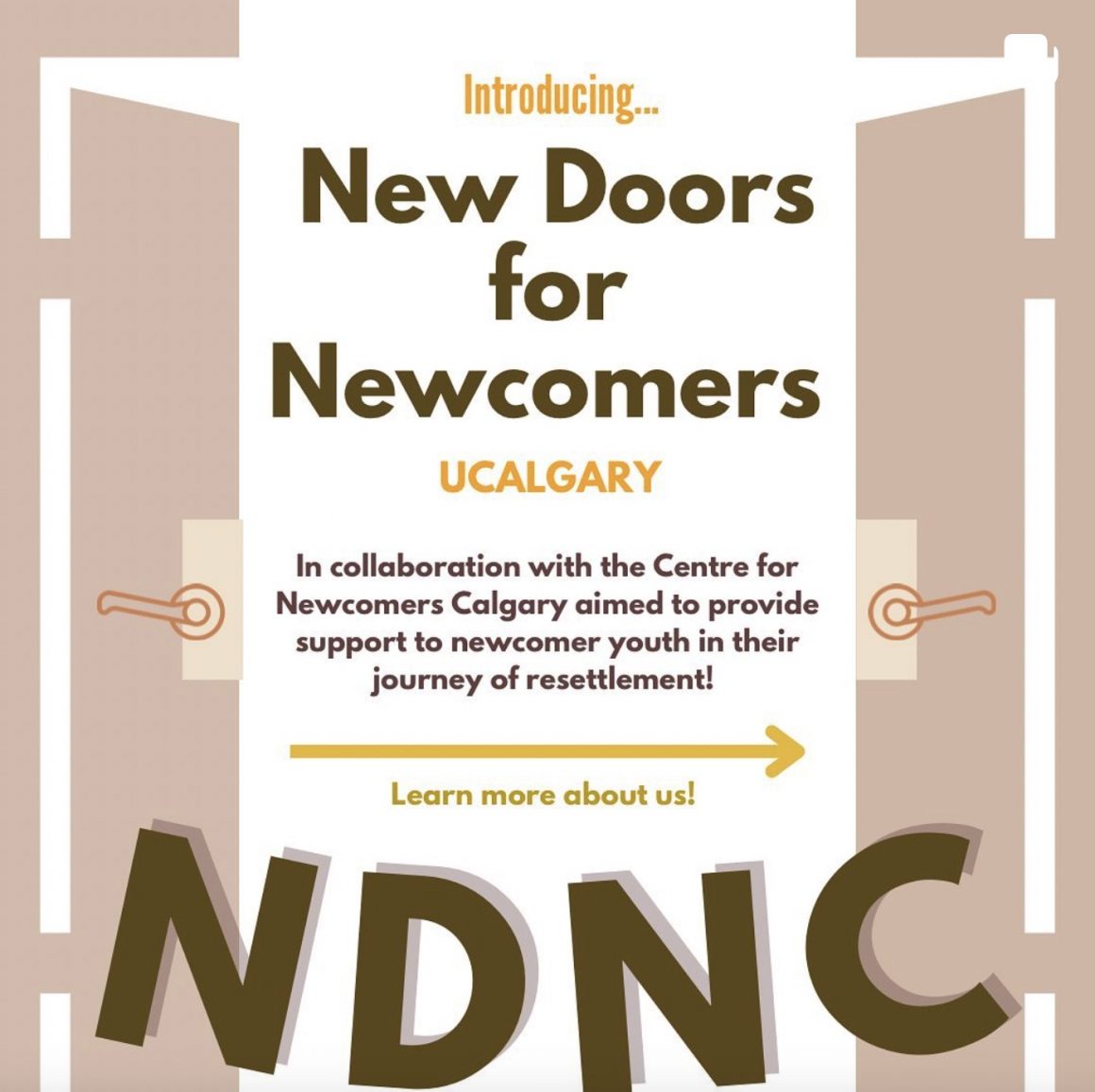
New Doors for Newcomers: A UCalgary club’s mission to support newcomer youth
By Dana ELRufaei, November 26 2024—
For many young refugees and immigrants arriving in Canada, the challenges of settling into a new life can feel overwhelming. From navigating a foreign education system to adjusting to new cultural norms, these youth often face a steep learning curve. However, one local student-run club has made it their mission to ease this transition by providing vital support and resources tailored to the unique needs of newcomer youth.
Co-founded in the fall of 2023 by University of Calgary (U of C) students Amna Idris and Sabika Azhar, New Doors for Newcomers (NDNC) is a Students’ Union (SU) club centred on addressing the unique challenges faced by immigrant and refugee youth. The club aims to create a welcoming space for students from all backgrounds, offering resources, mentorship and opportunities for open dialogue.
Personal motivations behind the club
The inspiration for NDNC came from the cofounders’ own experiences as newcomers to Canada. Azhar, who arrived as a refugee from Pakistan at the age of six, recalled the struggles her family faced during the early years of settlement, particularly around language barriers and cultural differences. In an Interview with the Gauntlet, Azhar explained that these experiences gave her a deep understanding of the difficulties newcomer youth often face.
“I witnessed my family navigate numerous challenges—settlement support, cultural shocks, and language barriers. This gave me a strong connection to the purpose of this club. We understand what it’s like to grow up in an environment where answers aren’t readily available, and much of the journey involves figuring things out on your own,” explained Azhar.
Idris, a second co-founder, shared her own story of witnessing the struggles of her Sudanese immigrant parents as they tried to rebuild their lives in Canada. She noted how even highly educated professionals like her parents face substantial barriers when their credentials are not recognized in their new country.
“I witnessed the significant setbacks my parents faced as they had to rebuild their lives from the ground up,” said Idris. “Understanding the challenges of establishing a career in Canada while adapting to a vastly different lifestyle, our club seeks to ease this transition. We aim to bridge the gap between newcomers and higher education.”
Challenges faced by newcomer youth
While many of the challenges faced by newcomer youth such as language barriers, isolation, and difficulty making friends are well-known — there are lesser-discussed struggles that often go unnoticed. One of the most significant issues, according to the club’s founders, is the added pressure placed on young people to act as caretakers for their families.
“A major challenge is that many youth end up taking on adult roles within their families. They become interpreters for their parents, translating during doctor’s appointments or helping them navigate social norms. This role reversal can be overwhelming, as these youth are expected to support their parents when they themselves are still adjusting to life in Canada,” explained Azhar.
This added responsibility often leads to significant emotional stress for many newcomer youth, who are balancing the expectations of their families with their own need for support and care.
Creating an inclusive and supportive environment
Adapting to a new environment can significantly impact a newcomer student’s academic and social life. NDNC emphasizes the importance of fostering a support system to help students overcome obstacles like language and cultural barriers, and combat feelings of isolation.
The club hosts a variety of events aimed at raising awareness about the challenges faced by newcomers and encourage student engagement in support efforts. These events include speaker nights, multicultural gatherings, and bake sales. One of the club’s most successful events was the “Taste of the World” multicultural cuisine night, which celebrated the diverse culinary traditions of over 13 cultures.
“Beyond the shared enjoyment of food, attendees had the opportunity to learn about different cultures and engage in insightful conversations by asking questions. Events like these help foster a more understanding and inclusive atmosphere on campus, promoting a welcoming environment for all,” explained Idris.
In addition to on-campus events, NDNC has expanded its impact to off-campus initiatives, such as mentorship programs, youth activity nights, literacy classes, and tutoring sessions. The club has made a name for itself on campus and in the broader community, becoming a key player in supporting newcomers.
NDNC has had several milestones, including the participation of prominent figures like Paula Calderon, CEO of the Calgary Immigrant Women’s Association (CIWA), and Noel Bahliby, Youth Programs Director at the Centre for Newcomers. Both took part in the “Stigma and Support” event, where students explored the stigma faced by newcomers and discussed effective strategies for combating it.
“The key takeaway for other students on campus is recognizing that struggle, trauma, and perseverance are unique to each individual. Even within these communities, there is no single, homogeneous definition of these experiences. Additionally, it’s important to recognize how much we can learn from these individuals. They bring a rich diversity of cultures, languages, and family dynamics from all over the world,” said Azhar.
How to get involved
For students interested in supporting NDNC’s mission, the first step is simple: connect. The club encourages students to follow them on Instagram (@ndnc_ucalgary) and join through the SU Club Hub. For quick access to the member sign-up form and volunteer opportunities that match your interests, visit the Linktree in their Instagram bio. The club values passion, empathy, and a willingness to learn, with specific skills like active listening and adaptability being particularly valuable in supporting newcomer youth.
This article is a part of our Voices section and does not necessarily reflect the views of the Gauntlet editorial board.
